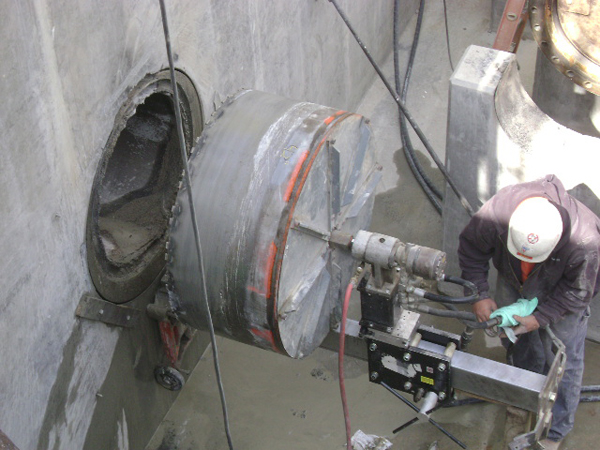So… What is core drilling?
Drilling round holes through floors or slabs is called core drilling. Core drilled openings can be used for things like plumbing, electrical, handrails, or wires, among other uses. The drill bits are hollow in the middle and when the cut is done, in addition to a round opening, you have a nice round “core” of concrete (or brick) left. Core drill bits vary in size from 1/2″ to as big as you want (JEM Concrete Cutting currently has bits from 1/2″ to 36″ in stock, but can order nearly any size bit with advance notice).
When scheduling core drilling service, these are some of the details to be aware of:
On the wall or slab to be drilled, we need this clearance:
6″ in all directions around the hole to be drilled
2′ (from the edge of the hole to be drilled), in one direction, in order for us to bolt the drill post to the wall.
5′ of space in front of the hole to be drilled for the drill post and drill.
While some core drilling applications can be hand drilled, the majority require the drill to be mounted to a post, which in turn needs to be securely anchored to the surface being drilled. To anchor the post, here are the most common methods:
If the surface is a concrete wall, we drill a small anchor hole (2″ deep and 5/8″ in diameter) and insert the anchor (which is left in the wall). The anchor is below the surface of the wall and is able to be covered up by the owner/contractor after the project is completed.
If an anchor bolt is unable to be used, we can drill the 5/8″ hole all the way through the wall and sandwich the wall (using a bolt through wood or metal plates on both sides of the wall), to create an anchor point.
If we are drilling on a slab, we can sometimes use a vacuum base to anchor the post. The big issue here is if we can get a good seal.
As with all concrete cutting, water is the most common lubricant and coolant for the core drill bit. One of the primary benefits of using water is dust reduction. This creates a “slurry”, which the water then carries out of the cut. Depending on where the cutting is done (inside or outside, finished or unfinished spaces), we can provide as much, or as little, “water/slurry control” as desired (letting it drain into the soil outside, using a shop vac to get the majority of it off a floor, or putting plastic up all around it to have maximum protection). With more control comes more prep time and thus increases the cost of the project. When water isn’t a viable option (for example, if mortar is drying) we are able to use nitrogen or air in its place.
If drilling a hole on a roof/floor, we will need to know what is below and how/if we need to “catch” the core. We can often drill close to the bottom of the floor and break off the majority of the core before we get through.
More often than not, we make use of on-site water and power when setting up a core drill. When either isn’t available or practical, we are positioned to provide our own.
Please contact JEM Concrete Drilling and Sawing of Northwest Indiana if you have questions about a concrete cutting or drilling need. We are committed to giving our customers excellent quality work in a timely fashion at a reasonable price.





